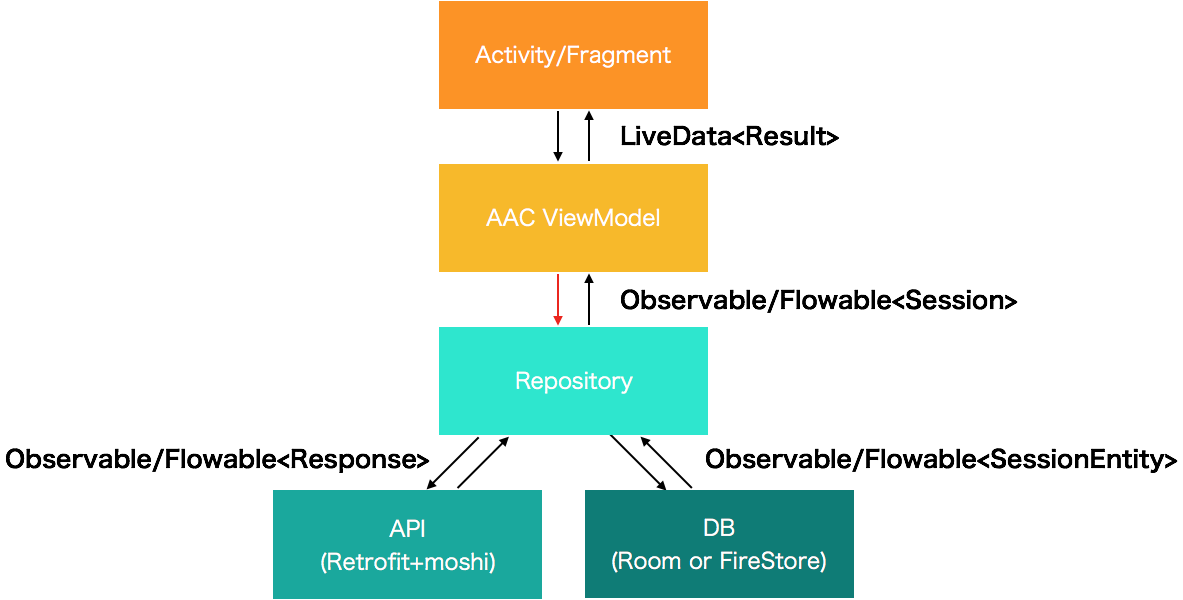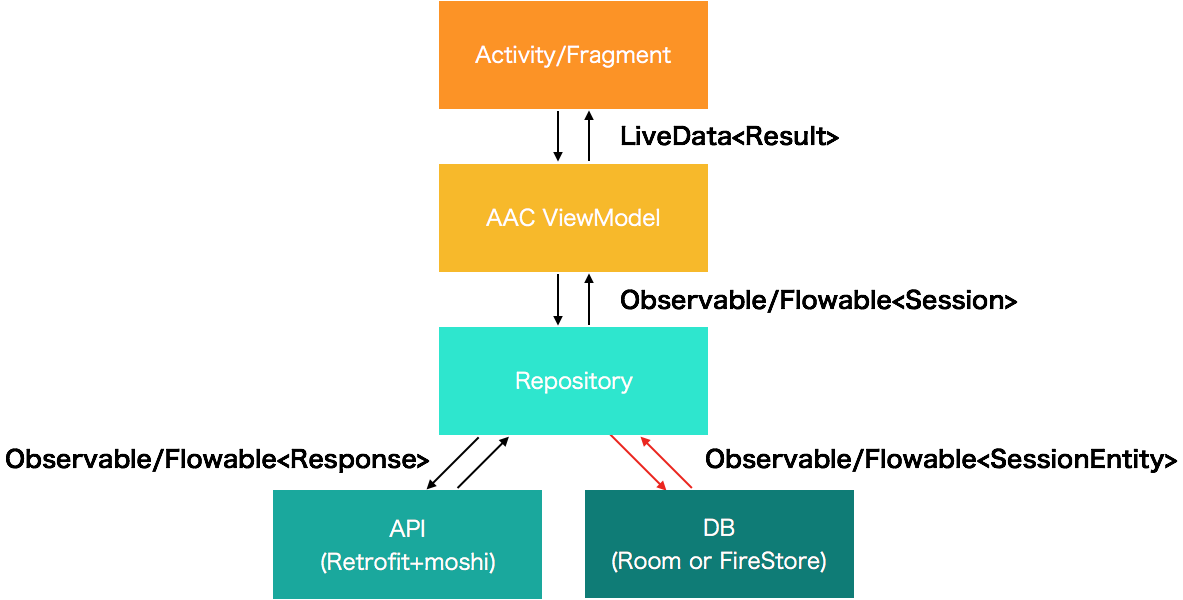DroidKaigi 2018 is a conference tailored for developers on 8th and 9th February 2018.
TBD
We use waffle.io to manage tasks. If you'd like to contribute to the project but are not sure where to start off, please look for issues labelled welcome contribute.
We've designated these issues as good candidates for easy contribution. You can always fork the repository and send a pull request (on a branch other than master).
We do accept suggestions for translations at res/values-**/strings.xml.
This app is full Kotlin!
Converting RxJava2's publisher to AAC LiveData with LiveDataReactiveStreams.
AllSessionsViewModel.kt
repository.sessions
.toResult(schedulerProvider)
.toLiveData()LiveDataReactiveStreamsExt.kt
fun <T> Publisher<T>.toLiveData() = LiveDataReactiveStreams.fromPublisher(this)By using Groupie you can simplify the implementation around RecyclerView.
data class SpeakerItem(
val speaker: Speaker
) : BindableItem<ItemSpeakerBinding>(speaker.id.hashCode().toLong()) {
override fun bind(viewBinding: ItemSpeakerBinding, position: Int) {
viewBinding.speaker = speaker
}
override fun getLayout(): Int = R.layout.item_speaker
}This app uses an Android Architecture Components(AAC) based architecture using AAC(LiveData, ViewModel, Room), Kotlin, RxJava, DataBinding, dependency injection, Firebase.
Use LifecycleObserver for telling lifecycle to ViewModel.
SessionsFragment.kt
class SessionsFragment : Fragment(), Injectable {
private lateinit var sessionsViewModel: SessionsViewModel
...
override fun onViewCreated(view: View, savedInstanceState: Bundle?) {
super.onViewCreated(view, savedInstanceState)
...
lifecycle.addObserver(sessionsViewModel)
...SessionsViewModel.kt
class SessionsViewModel @Inject constructor(
private val repository: SessionRepository,
private val schedulerProvider: SchedulerProvider
) : ViewModel(), LifecycleObserver {
...
@OnLifecycleEvent(Lifecycle.Event.ON_CREATE)
fun onCreate() {
...
}Use RxJava2(RxKotlin) and ViewModel#onCleared() for preventing leaking.
SessionsViewModel.kt
private val compositeDisposable: CompositeDisposable = CompositeDisposable()
@OnLifecycleEvent(Lifecycle.Event.ON_CREATE)
fun onCreate() {
repository
.refreshSessions()
.subscribeBy(onError = defaultErrorHandler())
.addTo(compositeDisposable)
}
override fun onCleared() {
super.onCleared()
compositeDisposable.clear()
}Use Retrofit and save to the Architecture Component Room.
SessionDataRepository.kt
override fun refreshSessions(): Completable {
return api.getSessions()
.doOnSuccess { response ->
sessionDatabase.save(response)
}
.subscribeOn(schedulerProvider.computation())
.toCompletable()
}Use Room with RxJava2 Flowable Support.
And SessionDataRepository holds Flowable property.
SessionDao.kt
@Query("SELECT room_id, room_name FROM session GROUP BY room_id ORDER BY room_id")
abstract fun getAllRoom(): Flowable<List<RoomEntity>>SessionDataRepository.kt
class SessionDataRepository @Inject constructor(
private val sessionDatabase: SessionDatabase,
...
) : SessionRepository {
override val rooms: Flowable<List<Room>> =
sessionDatabase.getAllRoom().toRooms()We create LiveData from a ReactiveStreams publisher with LiveDataReactiveStreams
SessionsViewModel.kt
val rooms: LiveData<Result<List<Room>>> by lazy {
repository.rooms
.toResult(schedulerProvider)
.toLiveData()
}LiveDataReactiveStreamsExt.kt
fun <T> Publisher<T>.toLiveData() = LiveDataReactiveStreams.fromPublisher(this) as LiveData<T>And using Result class for error handling with Kotlin extension.
fun <T> Flowable<T>.toResult(schedulerProvider: SchedulerProvider): Flowable<Result<T>> =
compose { item ->
item
.map { Result.success(it) }
.onErrorReturn { e -> Result.failure(e.message ?: "unknown", e) }
.observeOn(schedulerProvider.ui())
.startWith(Result.inProgress())
}sealed class Result<T>(val inProgress: Boolean) {
class InProgress<T> : Result<T>(true)
data class Success<T>(var data: T) : Result<T>(false)
data class Failure<T>(val errorMessage: String?, val e: Throwable) : Result<T>(false)
Fragment observe ViewModel's LiveData.
We can use the result with Kotlin when expression.
In is Result.Success block, you can access data with result.data by Kotlin Smart cast.
SessionsFragment.kt
sessionsViewModel.rooms.observe(this, { result ->
when (result) {
is Result.InProgress -> {
binding.progress.show()
}
is Result.Success -> {
binding.progress.hide()
sessionsViewPagerAdapter.setRooms(result.data)
}
is Result.Failure -> {
Timber.e(result.e)
binding.progress.hide()
}
}
})Thank you for contributing!
- Contributors
- Designer
This project uses some modern Android libraries and source codes.
- Android Architecture Components
- Android Support Libraries
- Support v4
- AppCompat v7
- Design
- VectorDrawable
- CardView
- ConstraintLayout
- RecyclerView
- AOSP Codes
- Firebase
- Dagger2, Dagger Android Support, Glide4 - Google
- Kotlin - JetBrains
- Retrofit2, Moshi - Square
- RxJava2, RxKotlin, RxAndroid - ReactiveX
- OkHttp3
- ThreeTenABP, Timber - JakeWharton
- Groupie - lisawray
- Stetho - Facebook
- Kotshi - ansman
- DownloadableCalligraphy - takahirom
- EllipsizingTextView
- Google I/O 2017
Copyright 2018 DroidKaigi
Licensed under the Apache License, Version 2.0 (the "License");
you may not use this file except in compliance with the License.
You may obtain a copy of the License at
http://www.apache.org/licenses/LICENSE-2.0
Unless required by applicable law or agreed to in writing, software
distributed under the License is distributed on an "AS IS" BASIS,
WITHOUT WARRANTIES OR CONDITIONS OF ANY KIND, either express or implied.
See the License for the specific language governing permissions and
limitations under the License.







